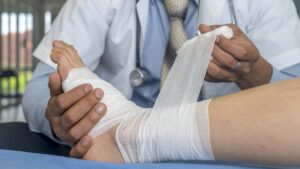Health Check: Fresh from its FDA win, Echo IQ aims for even bigger heart failure approval

Pic via Getty Images
- Echo IQ shares soar after the FDA approves its aortic stenosis diagnosis.
- Pacific Edge’s cancer diagnostic revenues hold up despite US reimbursement doubts
- Recce Pharmaceuticals reaches halfway mark in phase II germ-busting trial
Health Check is renowned biotech journo Tim Boreham’s daily wrap covering morning movers and shakers of note in the ASX Healthcare sector, Monday through Thursday.
Having just obtained US Food & Drug Administration (FDA) marketing approval for its aortic stenosis diagnostic, Echo IQ (ASX:EIQ) is preparing to front the regulator for assent for the bigger indication of heart failure.
Emerging from a trading halt this morning, Echo shares leaped 21% on the back of yesterday’s US aortic stenosis go-ahead – the first approval globally for the company.
Pleased – and relieved – Echo executive chairman Andrew Glover said he was “95%” confident of approval.
“We have been in conversation (with the FDA) for 18 months and have followed the process to a ‘T’,” he says.
The company will waste no time in commercialising the AI-based tool, which aims to highlight, automatically, patients with significant risk of the disease.
“Widespread and chronically underdiagnosed”, aortic stenosis is when the heart valve narrows, usually due to calcification, making it harder for the heart to pump blood.
Rather than replace the standard-of-care echocardiograms, EchoSolv AS seeks to add additional diagnostic information to these widely available and cost-effective scans.
But when a patient presents with – say – breathlessness, it takes time and effort to isolate the cause.
The US has about 1.5 million US aortic stenosis sufferers, who cost the health system US$10 billion annually.
Assuming 10% market penetration, Glover estimates US revenue of US$6.5 million per annum. As always, US Medicare reimbursement is the key and Glover expects clinicians to receive US$68-70 per test, with the company pocketing about 25% of this benefit.
Glover adds that the test is also helpful in detecting the disease in patients not considered high risk.
Prior to FDA approval, Echo IQ had entered discussion with parties including large hospital groups, device manufacturers and pharmaceutical companies “on the commercial and clinical benefits of EchoSolv AS”.
With heart failure, Glover estimates a US$42 million-a year market, also assuming a 10% market penetration.
Armed with the results of a supportive Australian study, the company is preparing an FDA application “which we hope to have [lodged] this side of Christmas”.
This morning, the company also appointed a US-based CEO, Dustin Haines to spearhead the US commercialisation.
Haines was a vice president and general manager at the $US105 billion market cap, Nasdaq-listed Gilead Sciences.
Echo IQ shares were 21% higher at 29 cents.
Pacific Edge holds its bladder (tests) in uncertain times
Speaking of the US diagnostics market, Pacific Edge (ASX:PEB) has withstood the impact of uncertainty over its US public insurance coverage with only a slight reduction in September quarter testing volumes.
The Dunedin (NZ) based company cites continued strong demand from its key US customer Kaiser Permanente and volume gains in its Asia Pacific markets.
The company’s total laboratory throughput fell 2% to 7045 tests, with US volume down 3.8% to 56832 assays.
Asia-Pacific volumes grew 6.2% to 1,363 tests.
Pacific Edge’s core product, Cxbladder is a urine-based genomic biomarker test for the detection and surveillance of bladder cancer. The test is certified as a laboratory assay and available globally.
In July the US Centers for Medicare & Medicaid Services (CMS) granted an extension to Novitas, the company’s Medicare administrative contractor, an extension on its decision as to whether the tests should be covered.
In the meantime the company continues to receive Medicare/Medicaid reimbursement, “as it has without interruption since July 2020”.
The company harnesses the views of the esteemed American Urological Association’s review of its microhematuria guideline, which support the “clinical and economic value” of urine biomarkers such as Cxbladder.
Microhematura is when urine is normal in colour, but contains elevated red blood cells as detected by a microscope.
The company points to preliminary data from a study by Southern California Permanente Medical Group, which demonstrates the clinical utility of Cxbladder as a triage tool.
The company had expected the reimbursement question to be decided by the time of its September 2024 AGM, but has not provided a revised timeline.
As it awaits this all-important insurance adjudication, the company is preserving cash and reducing its sales team.
Not surprisingly, the reimbursement uncertainty has weighed heavily on Pacific Edge shares, down 70% over two years. But over the last month they’ve staged a mini revival – up 50% – and this morning were steady at 12 cents.
Recce Pharmaceuticals is halfway there and not turning around
At what point should a drug developer update the market on patient enrolment in a clinical enrolment?
There’s no definitive answer, but the halfway mark sounds about right.
As James Blunt croons in Halfway: “no-one drives to the middle of nowhere just to turn around”.
So we duly give airtime to Recce Pharmaceuticals (ASX:RCE), which has dosed 15 out of 30 intended patients in its phase II trial for Acute Bacterial Skin and Skin Structure Infections (ABSSSI).
Yep, that’s 50% or one half.
ABSSSI-es include diabetic foot infections, necrotising fasciitis and post-operative wound infections.
The trial tests Recce’s topical gel, R327G, part of its portfolio of synthetic anti-infectives aimed at negating the growing problem of antibiotic resistant superbugs.
To date, R327G has shown “promising antibacterial effects across a broad range of human infections”.
Conducted at sites in NSW and Victoria, the interim results of the latest trial are due later this year.
Recce shares were down 2% to 52 cents.
At Stockhead we tell it like it is. While Recce Pharmaceuticals is a Stockhead advertiser at the time of writing, it did not sponsor this article.
Related Topics

UNLOCK INSIGHTS
Discover the untold stories of emerging ASX stocks.
Daily news and expert analysis, it's free to subscribe.
By proceeding, you confirm you understand that we handle personal information in accordance with our Privacy Policy.








